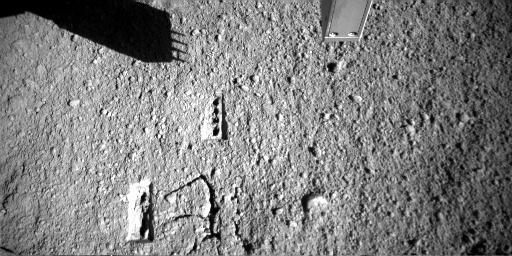
|
Martian Surface after Phoenix’s Conductivity Measurements
- Click the image above for a larger view
- Full-Res JPEG (512 x 256) (44.4 kB)
- Full-Res TIFF (512 x 256) (131.4 kB)
Caption:
NASA's Phoenix Mars Lander's Robotic Arm Camera took this image on Sol 71 (August 6, 2008), the 71st Martian day after landing. The shadow shows the outline of Phoenix's Thermal and Electrical Conductivity Probe, or TECP. The holes seen in the Martian surface were made by this instrument to measure the soil's conductivity. A fork-like probe inserted into the soil checks how well heat and electricity move through the soil from one prong to another.
The measurements completed Wednesday ran from the afternoon of Phoenix's 70th Martian day, or sol, to the morning of Sol 71.
Background Info:
The Phoenix Mission is led by the University of Arizona, Tucson, on behalf of NASA. Project management of the mission is by NASA's Jet Propulsion Laboratory, Pasadena, Calif. Spacecraft development is by Lockheed Martin Space Systems, Denver.
Photojournal Note: As planned, the Phoenix lander, which landed May 25, 2008 23:53 UTC, ended communications in November 2008, about six months after landing, when its solar panels ceased operating in the dark Martian winter.
Cataloging Keywords:
| Name | Value | Additional Values |
|---|---|---|
| Target | Mars | |
| System | ||
| Target Type | Planet | |
| Mission | Phoenix | |
| Instrument Host | Phoenix Lander | |
| Host Type | Lander | |
| Instrument | Robotic Arm Camera (RAC) | |
| Detector | ||
| Extra Keywords | Grayscale, Shadow, Thermal | |
| Acquisition Date | ||
| Release Date | 2008-08-11 | |
| Date in Caption | 2008-08-06 | |
| Image Credit | NASA/JPL-Caltech/University of Arizona/Max Planck Institute | |
| Source | photojournal.jpl.nasa.gov/catalog/PIA11022 | |
| Identifier | PIA11022 | |
